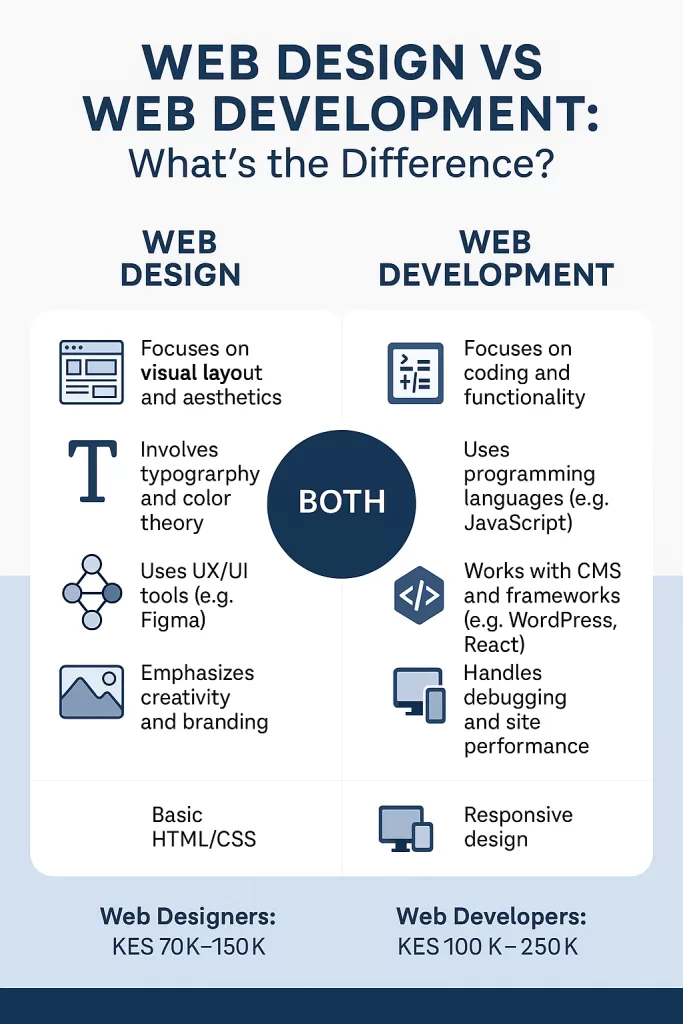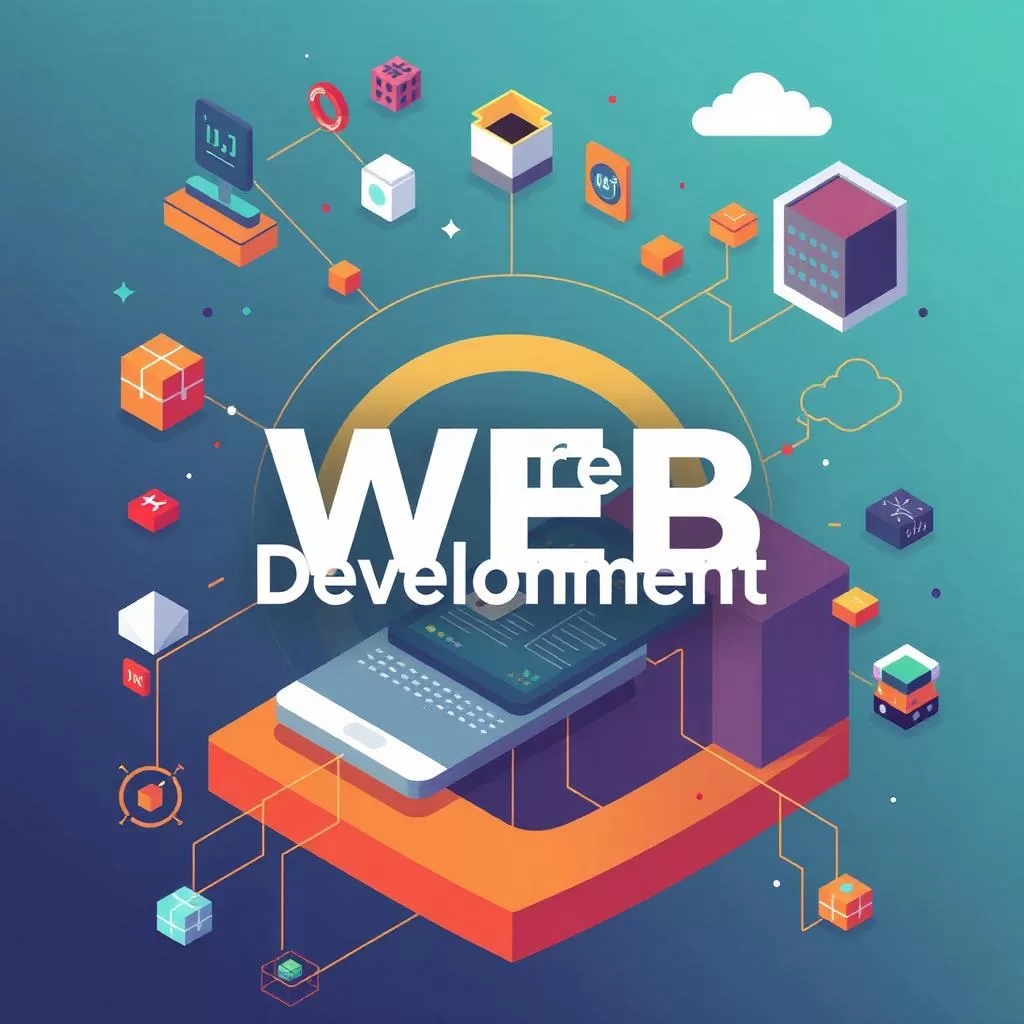Web Design vs Web Development in Kenya: What’s the Difference?
Web Design vs Web Development
In Kenya’s growing digital economy, websites have become critical to business success, education, and communication. Whether you’re launching an e-commerce store in Nairobi or creating a blog in Kisumu, you’ll often hear the terms “web design” and “web development.” Many use them interchangeably, but they refer to two distinct roles with different skill sets, responsibilities, and goals. So, what exactly is the difference between the two—and which one is the right path for you? We will therefore do a comparison of Web Design vs Web Development in Kenya.
Design vs Development: Defined
Let’s begin by understanding the core definitions.
Web design refers to the visual aesthetics and usability of a website. Designers are responsible for how the website looks and feels. This includes layout, color schemes, typography, branding, and user experience (UX) design. They often use tools like Figma, Adobe XD, and Canva to create mockups or prototypes of websites before development begins.
On the other hand, web development involves turning those designs into a functioning website using programming languages and frameworks. Developers handle the technical structure, interactivity, and functionality of a website. They use HTML, CSS, JavaScript, PHP, and frameworks like React or Laravel.
Example:
If you imagine building a house, the web designer is the architect who sketches the layout and interior look, while the web developer is the engineer who constructs it with bricks and cement.
Required Skills for Each Role
Web Designers Need:
- Knowledge of color theory, typography, and layout principles
- Understanding of UX/UI best practices
- Tools like Figma, Adobe XD, Photoshop
- Basic HTML/CSS (optional but useful)
- Creative thinking and visual communication skills
Web Developers Need:
- Proficiency in coding languages like HTML, CSS, JavaScript, and PHP
- Familiarity with CMS platforms like WordPress or Joomla
- Experience with frameworks such as React, Vue, or Laravel
- Version control tools like Git and GitHub
- Problem-solving and logic-based thinking
Designers focus more on creativity and user experience, while developers build the infrastructure that allows the website to function.
Career Paths & Salaries in Kenya
Both web design and development are in-demand fields in Kenya, with opportunities in agencies, startups, corporations, and freelancing.
Web Design Career Path:
- Junior Designer → UX/UI Designer → Senior Designer → Creative Director
Freelance designers often create branding kits, design website layouts, and collaborate with developers.
Web Development Career Path:
- Junior Developer → Full Stack Developer → Lead Developer → CTO (Chief Technology Officer)
Developers can specialize further into frontend, backend, or full stack roles.
Salary Estimates in Kenya:
- Entry-level Web Designer: KES 20,000 – 50,000/month
- Experienced Web Designer: KES 70,000 – 150,000/month
- Entry-level Developer: KES 30,000 – 60,000/month
- Experienced Developer or Full Stack: KES 100,000 – 250,000/month
Freelancers on international platforms like Upwork or Fiverr can earn even more depending on their portfolio and client base.
FAQs
Are web design and web development the same?
No. Web design is about how a website looks and feels. Web development is about how it works. While there’s some overlap, each requires a distinct set of skills and tools.
Who designs a web page and who develops it?
A web designer creates the layout, visuals, and user experience of the page. A web developer takes that design and builds it using code so that it functions in a browser.
Can one person do both web design and development?
Yes. Many professionals become full-stack developers or designer-developers, especially freelancers. However, mastering both areas takes time and dedication.
Which career pays more in Kenya: web design or web development?
Generally, web developers tend to earn more, especially with experience and full stack capabilities. However, top-tier designers with UX/UI expertise can also command high salaries.
Do I need a degree to become a web designer or developer?
Not necessarily. Many successful professionals in Kenya are self-taught or have completed online courses. What matters most is your portfolio and problem-solving ability.
Is coding required for web design?
Not always. While basic HTML/CSS is helpful, many designers use no-code tools like Webflow or WordPress. Deeper coding is typically the developer’s domain.
What are some good learning platforms for each?
For web design: Coursera, Canva Design School, and YouTube channels like Flux. For development: FreeCodeCamp, The Odin Project, and Codecademy.
How long does it take to learn web design or development?
It depends on your pace. With consistent effort, you can become job-ready in 6–12 months. Intensive bootcamps can speed up the process.
Which is more creative: design or development?
Web design leans more into creativity and visual aesthetics, while development involves more logic and structure. Creative coders may enjoy blending both worlds.
Can I freelance in both areas?
Absolutely. Many Kenyan freelancers offer both design and development as a package, which makes them more competitive and versatile in the job market.
Conclusion: Choosing Between Web Design and Web Development in Kenya
In a rapidly digitizing world—especially in Kenya’s booming tech landscape—both web design and web development offer exciting, future-proof career paths. However, the path you choose depends on your interests, strengths, and long-term goals.
If you have a strong eye for visual detail, enjoy crafting beautiful interfaces, and love enhancing user experiences, web design might be the right fit for you. On the other hand, if you’re driven by problem-solving, logic, and building interactive features with code, web development will likely be more fulfilling.
Importantly, the lines between these two roles are increasingly blending. Many successful professionals in Kenya are adopting hybrid roles—becoming “design-savvy developers” or “tech-enabled designers”—to meet the market’s growing demand for end-to-end website solutions.
No matter where you start, the web offers limitless opportunities. With access to free learning platforms, global freelance marketplaces, and a thriving digital ecosystem, you can build a successful career right from your laptop in Nairobi, Mombasa, Eldoret, or anywhere else in the country.
Start where you are, with what you have. Whether you’re a student, entrepreneur, or someone switching careers, now is the best time to invest in your digital future. The skills you build today could power Kenya’s next wave of innovation.
Key Takeaways: Web Design vs Web Development
Different but Complementary
While often confused, web design and web development are two distinct disciplines. Designers focus on visuals and user experience, whereas developers handle functionality and technical implementation. Both are essential for a successful website.
Creative vs Logical
Web design leans toward creativity, aesthetics, and intuitive navigation. In contrast, web development is grounded in coding, logic, and making things work behind the scenes. Your personal strengths can help determine the best fit.
Tools of the Trade
Designers typically use tools like Figma, Adobe XD, or Canva to visualize site layouts. Developers, on the other hand, rely on programming languages like HTML, CSS, and JavaScript, and often use frameworks like React or Laravel.
Career Flexibility in Kenya
Both fields are growing fast locally. Whether you’re based in Nairobi, Eldoret, or Mombasa, there are freelance and full-time roles in agencies, startups, and even remote global teams.
Learning Is Accessible
You don’t need a university degree to enter either field. With free platforms like FreeCodeCamp, YouTube, and Coursera, you can learn at your own pace and build a strong portfolio from home.
Earning Potential
While developers may command slightly higher salaries due to technical complexity, highly skilled UX/UI designers also earn well—especially those who work with international clients or offer niche services.
Hybrid Roles Are Rising
Many professionals choose to learn both design and development. This makes them more marketable and capable of handling end-to-end website projects, particularly in Kenya’s freelancing ecosystem.
Start with Your Strengths
If you’re visually inclined, start with design. If you enjoy problem-solving and building tools, development may be a better fit. The beauty of tech is that you can always pivot or expand your skills later.
Real-World Impact
Whether you choose design, development, or both, you’ll be building digital tools that help real businesses, NGOs, and individuals thrive in an increasingly online world.
Ready to Build or Redesign Your Website?
If you’re looking to transform your idea into a fully functional website, our expert developers at Teknikali Tech are here to help. Whether it’s a business site, e-commerce store, or custom web application, we deliver clean code, responsive design, and seamless user experience.
👉 Explore our Web Development Services
Further Reading on Web Design Vs Web Development
Want to dive deeper into the world of design and development? Here are some trusted resources:
For an in-depth guide on building a website that ranks well on search engines, check out our latest article:
🔗 AI for White-Hat SEO: 8 Tips for Sustainable Growth

Share this content:







14 comments